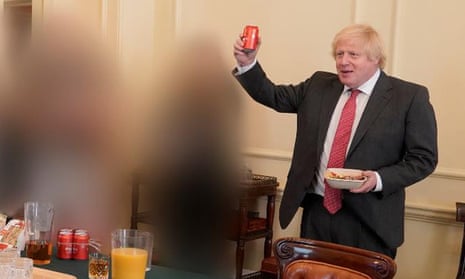Lawyers hired by Boris Johnson to rubbish the Commons Partygate inquiry have a “systemic misunderstanding” of parliamentary process and used “misplaced analogies”, according to a group of senior MPs.
In a fightback campaign to avoid the investigation into the former prime minister being derailed, the privileges committee drew up a dossier to refute criticism about its work.
The MPs hit out at “personal attacks” levelled against them by Johnson’s allies, saying the unprecedented and groundless criticism could constitute contempt of parliament.
Legal advice from David Pannick and Jason Pobjoy commissioned in the dying days of Johnson’s administration at a cost of £130,000 to the taxpayer argued that the committee was using “a fundamentally flawed approach” and unfair procedures.
The committee’s rebuttal dossier was due to be published earlier this month but was delayed after the death of the Queen and wrangling over who should fill a vacant spot among its seven members.
Published on Monday, the “special report” says Lord Pannick and Pobjoy’s advice was “founded on a systemic misunderstanding of the parliamentary process and misplaced analogies with the criminal law”.
It says claims that MPs needed to show Johnson’s misleading of parliament was intentional were wrong, as it was implicit in the motion that set up the inquiry based on precedent and the parliamentary rulebook known as Erskine May.
It rubbishes the claim that punishing politicians who unknowingly mislead parliament would have a “chilling effect”, saying ministerial mistakes in the Commons are not a problem “if corrected quickly”.
“If we find that the house was misled, one question the committee is likely to consider is how quickly and sincerely Johnson sought to correct the record,” it says.
Johnson told MPs in December 2021 that “all guidance was followed completely in No 10”, six months before Scotland Yard issued more than 100 fines, including to the then prime minister personally, for law-breaking Covid parties.
Pannick and Pobjoy also said it was unfair that the identity of anonymous whistleblowers who give evidence may not be revealed to Johnson.
after newsletter promotion
The committee admits that “the prospect of anonymous evidence may raise issues in relation to fairness which will need to be tackled”, but says this “would necessarily be on a case-by-case basis”, and only if it were satisfied the evidence was “relevant and credible”.
No such anonymous witnesses with credible evidence have yet come forward, “and it may be that this situation does not arise”, the committee says. If it does, “we will publish proposals for a fair process and Mr Johnson will be invited to comment”, the MPs add.
Johnson wrote to the privileges committee just four days before stepping down as prime minister, saying that “what Lord Pannick has to say speaks for itself”, and adding: “Please consider this a formal representation on my behalf.”
The Guardian revealed last week that the well-respected veteran Conservative MP Charles Walker was being lined up to take the last of four Tory seats on the seven-member committee.
